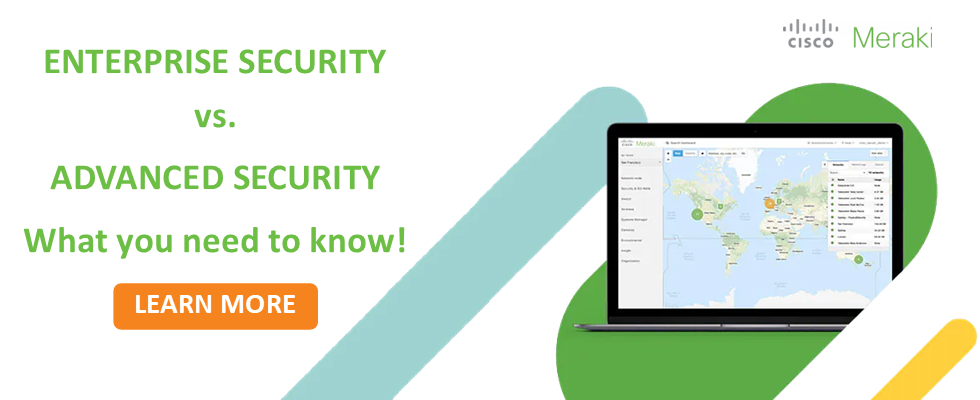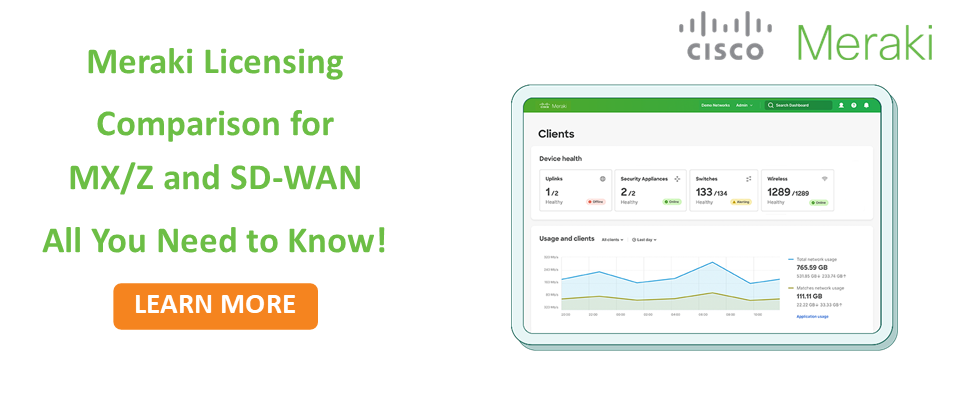Cisco Meraki Enterprise Security vs. Advanced Security: A Comparative Overview
Cisco Meraki offers two key security licensing options for its MX security appliances: Enterprise Security and Advanced Security. Both options provide robust tools to safeguard networks, but they are designed to meet different security needs. Understanding the differences between the two can help organizations choose the right solution based on their security requirements and risk profiles.
1. Core Features of Cisco Meraki Enterprise Security
The Enterprise Security license is the entry-level option, designed for businesses that need basic firewalling and VPN features without the need for more advanced threat detection and prevention mechanisms. Key features of the Enterprise Security license include:
- Stateful Firewall: This firewall filters incoming and outgoing traffic based on pre-defined rules, allowing for basic traffic control and security.
- VPN Support (Auto VPN): Enterprise Security provides VPN connectivity for remote sites, enabling secure communication between branch offices or with remote workers.
- Content Filtering: Enterprise Security comes with basic URL filtering capabilities that allow administrators to block specific websites or categories of content (e.g., adult content, social media) to help protect the network and improve productivity.
- Application Control: This allows administrators to manage traffic by application type, offering some control over bandwidth usage and traffic shaping.
While these features are suitable for smaller organizations or those with lower security risks, they lack some of the more advanced threat prevention measures needed in today's complex security environment.
2. Advanced Security License: Enhanced Threat Protection
For businesses that require a more comprehensive security solution, the Advanced Security license provides a wide range of additional features to address modern cybersecurity threats. In addition to all the features of the Enterprise Security license, Advanced Security includes:
- Intrusion Detection and Prevention System (IDS/IPS): Powered by Snort, this system detects and blocks malicious traffic in real-time based on regularly updated threat signatures. This is crucial for organizations that are concerned about network-based attacks, such as exploits, malware, and advanced persistent threats.
- Advanced Malware Protection (AMP): Cisco's AMP integrates with the Meraki MX appliance to offer signature-based malware detection, file sandboxing, and retrospective alerts for potentially malicious files that were initially allowed through the network. This feature dramatically improves the network's ability to detect and respond to malware threats.
- Content Filtering (Enhanced): While the Enterprise license offers basic content filtering, Advanced Security provides more granular control over content categories and allows for more customization, enhancing the ability to block or allow specific types of content.
- Geolocation-based Firewalling: Advanced Security includes the capability to block traffic based on geographic location, providing an additional layer of defense against attacks originating from specific regions.
- Cognitive Threat Analytics: This feature enhances security by using machine learning to detect anomalies and suspicious patterns in network traffic that may indicate a breach or malware infection.
- Web Search Filtering and Safe Search Enforcement: These tools offer enhanced controls over web searches, particularly in educational or professional settings where inappropriate or harmful content needs to be restricted.
3. Choosing Between the Two
The decision between Enterprise Security and Advanced Security ultimately comes down to an organization’s specific security needs, budget, and risk tolerance.
- Enterprise Security is well-suited for small to medium-sized businesses or those that prioritize basic security features, including firewall, VPN, and basic content filtering. It provides a good balance of essential features without over-complicating the security architecture.
- Advanced Security, on the other hand, is aimed at businesses that require stronger protection from emerging threats, such as malware, exploits, and other advanced cyberattacks. It is particularly suitable for organizations in industries like healthcare, finance, or any enterprise that handles sensitive or regulated data.
Cisco Meraki’s Enterprise Security and Advanced Security licensing options cater to different business needs. Enterprise Security provides fundamental features that support basic network security, while Advanced Security extends protection to cover sophisticated threats through enhanced tools like IDS/IPS and AMP. For organizations looking to defend against modern cybersecurity challenges, Advanced Security offers a more comprehensive, proactive approach, while Enterprise Security serves as a solid foundation for smaller networks or businesses with minimal security requirements. Understanding the differences can ensure the right balance between cost and security.




